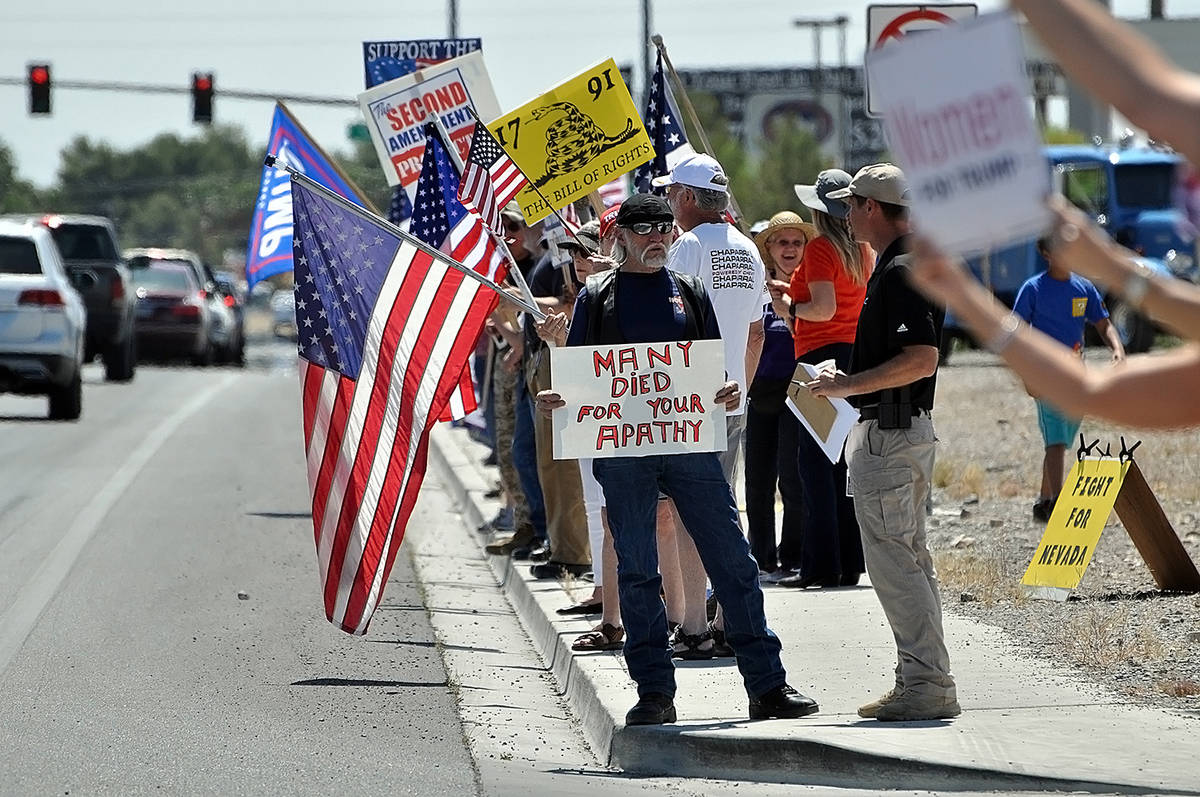
Federal District Court Judge Richard Boulware on Friday, May 15 denied Fight for Nevada’s request to indefinitely extend the 90-day period mandated by state law to gather signatures to recall Gov. Steve Sisolak.
Fight for Nevada argued on First and Fourteenth Amendment grounds that, because of the COVID-19 pandemic, the rights to free speech, political association, equal protection and due process were endangered without an extension. Boulware clearly did not agree, specifically noting federal courts have not established a constitutional right to place a recall election on the ballot.
“While there is certainly a federal protected right to vote and to associate for political purposes, the Court is not convinced that Plaintiff has adequately demonstrated that such federally protected rights extend to the filing of recall petitions,” Boulware wrote.
The judge also noted that there is precedent in the case from the Nevada Supreme Court, citing a 2010 decision in Strickland v. Waymire, in which citizens sued and challenged the recall provision of the Nevada Constitution that requires signatures from 25% of the electorate that voted in the previous election rather than 25% of registered voters.
The plaintiffs in that case argued that using the former standard would abridge voters’ right to have access to the ballot, but the Nevada Supreme Court disagreed, noting that argument “conflates the right to submit a petition calling for recall with the right to vote at the special election that follows, which are two different things.”
Boulware cited the state’s “interest in promoting the efficient regulation of recall petitions so that some sort of order, rather than chaos accompanies the process, and a costly special election at the taxpayers’ expense ahead of the next scheduled election is not called except as provided in the state constitution.”
Boulware dealt an additional blow to Fight for Nevada’s case when he wrote that even if the court found there was a legitimate ballot-access claim, “Plaintiff has not presented evidence sufficient to demonstrate a severe burden on any First Amendment right.”
To the argument that the pandemic was the reason for not gathering the required 243,995 signatures within the constitutionally mandated 90-day period, Boulware wrote “that Plaintiff was already so far from its goal by March 30, 2020 gives less credence to the argument that the emergency directives, as opposed to other reasons, such as a lack of diligence, prevented Plaintiff from acquiring the requisite signatures.”
March 30 was the midway point of the 90-day period, and by that point Fight for Nevada had submitted 15,892 signatures to the secretary of state, which is 6.5% of the signatures necessary. On April 2, Secretary of State Barbara Cegavske, a defendant in the suit, confirmed she would not extend any deadlines for submitting recall petitions.
In any event, Boulware went on to note that “nothing prevents Plaintiff from filing another notice of intent and beginning the process anew.” Later in the decision, he wrote that “The Court does not find that an inability to file this particular recall petition presents a severe burden when Plaintiff has not established with any detail what additional burden or inconvenience it faces if the Secretary does not extend the deadline.”
Cegavske, a Republican, suffered what turned out to be a minor defeat when Boulware refuted the claim that the court had no jurisdiction to intervene in the case. Boulware wrote that “the Secretary argues that Plaintiff does not present any federal claims and only raises questions of state law, because the right to recall a public officer arises from the Nevada Constitution only.”
Although Boulware would side with Cegavske, he claimed that because the complaint invoked federal question jurisdiction, the district court could dismiss the claims only if the alleged claim appears to be immaterial and made “solely for the purpose of obtaining jurisdiction,” or if the claim is “wholly insubstantial and frivolous.”
The judge said neither condition applied, because while “the Court ultimately agrees with the Secretary that Plaintiff has not established a likelihood of success or a serious question going to the merits of its claims, the Court does not find Plaintiff’s claims are so frivolous as to strip the Court of its jurisdiction to hear the case.”
In conclusion, Boulware wrote that the court found “plaintiff has not established a deprivation of a constitutional right” and therefore did not establish irreparable harm. Because the court found Fight for Nevada had not “established a likelihood of success on the merits of its First and Fourteenth Amendment claims, “the Court denies the motion for a temporary restraining order.”
According to fivethirtyeight.com, 19 states allow for the recall of state officials. California has been especially fertile ground for recall petitions, with 49 attempts to recall a California governor in the past 106 years.
Only four gubernatorial recall efforts have ever reached the ballot: in North Dakota in 1921, in Arizona in 1988 (although the election was canceled after Republican Gov. Evan Meacham was impeached), in California in 2003 and in Wisconsin in 2012. Only twice has a governor lost the recall election.